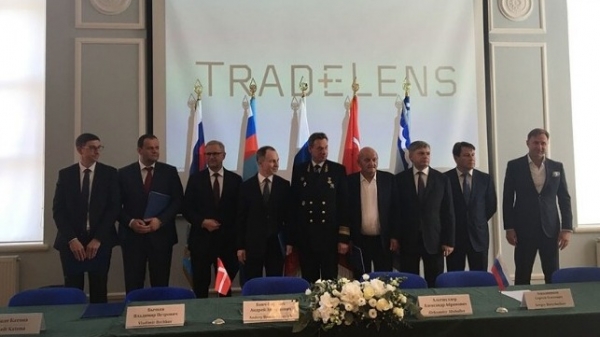News
Latest news
Maersk Furthers Business in Russia
A.P. Moller - Maersk and Russian Ministry of Transport signed a Memorandum of Understanding on June 5, enabling the launch of TradeLens in Russia. The blockchain enabled platform, jointly developed by Maersk (through its subsidiary Maersk GTD Inc.) and IBM, is expected to significantly facilitate international trade, not least by the inclusion of the Port of St. Petersburg, Russia’s main container gateway, as part of the pilot launch.
The agreement, signed by Maersk CEO Søren Skou and Yuriy Tsvetkov, Deputy Transport Minister, enables the implementation of TradeLens on the Russian market with the aim of introducing digital documentation flow in what is currently mostly paper-based transportation processes.
“The main result of the implementation of TradeLens, according to our expectations, should be an increase in the transparency of the contracting procedure by distributing information about supply and demand, conditions and operations between many participants of the transport and logistics processes” said Tsvetkov.
Last week it was announced that more carriers will be joining the blockchain-enabled digital shipping platform, which will result in data for nearly half of the world’s ocean container cargo shortly available on TradeLens.
TradeLens enables participants to connect, share information and collaborate across the container logistics supply chain ecosystem. Members gain a comprehensive view of their data and can digitally collaborate as cargo moves around the world, helping create a transparent, secured, immutable record of transactions.
With more than 100 participants on the platform today, TradeLens is already processing over 10 million discrete shipping events and thousands of documents each week, providing shippers, carriers, freight forwarders, customs officials, port authorities, inland transportation providers and others a common view of transactions, which can build trust. A commitment to data ownership rights and permissioned access to data helps ensure privacy and confidentiality, while enabling users to collaborate more efficiently with real-time access to shipping data.
Maersk to build its first cold store in St. Petersburg
Also on June 5, Maersk participated in the ground-breaking ceremony for the new warehouse in St. Petersburg. Constructed by the Russian industrial developer PNK Group, the 23,700 square meter facility will be located within the PNK Park Sofiyskaya KAD in St. Petersburg. It will have 35 docks able to serve daily throughput of up to 200 trucks. The maximum storage capacity will be over 50,000 tons, and the fully Maersk-operated warehouse will employ over 200 employees.
Approximately 40 percent of the new warehouse will be occupied by European fruit company Fyffes, with the remaining capacity available for other customers from the fresh and frozen produce segment. The new cold store will enable Maersk to offer end-to-end solutions to Russian customers.
The facility will offer separate storage chambers for frozen produce (-25°C), chilled (+2/+8°C), as well as for bananas, which require a specific temperature of +13°C.
Fyffes Chairman David McCann said: “Today’s ground-breaking is a very important milestone in Fyffes’ strategy to grow our business in Russia. As the largest importer of bananas in Europe, Fyffes is delighted to partner with Maersk in this new warehouse development, which will increase our ripening capacity in Russia to over 200 thousand boxes of bananas per week.”
In 2018, imports of fruit to Russia increased, with banana imports going up by one percent, citrus fruits by 7.4 percent and apples by nearly 13.5 percent compared to the year before. Experts expect fruit imports to continue to increase in the coming years. Since 2017, Russia has been the second largest importer of bananas in the world, after the U.S. and surpassing Germany.
Reference: maritime-executive.com




















